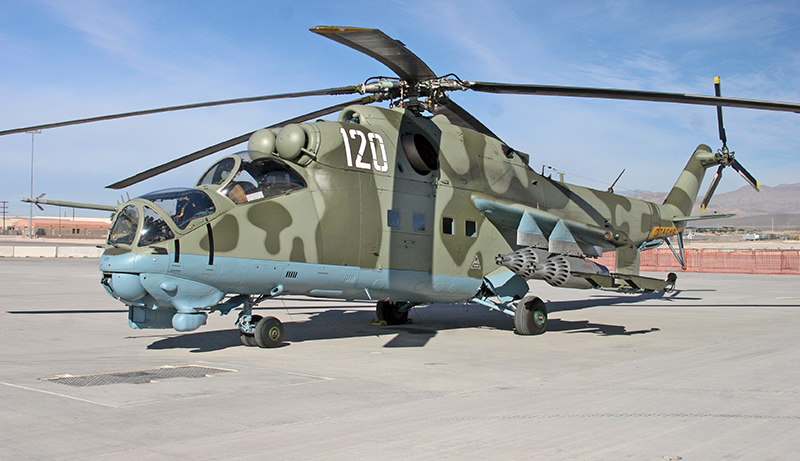Russian Mi-24 Attack or Mi-17 Transport Helicopters Could Augment Training Authenticity.
A report in the Marine Corps Times from Friday, April 27 by journalist Kyle Rempfer revealed that the U.S. Marine Corps Air Ground Task Force Training Command has filed a solicitation for contractors to provide Russian-built Mi-24 Hind attack helicopter or an Mi-17 Hip transport helicopter to serve as accurate opposing forces threat simulation aircraft.The aircraft would be equipped with electronic tracking pods for integration into simulated combat exercises at the MCAS Yuma Range and Training Area (RTA), a large training facility in the Arizona desert. The Yuma Range and Training Area accurately replicates current and potential threat environments throughout the Middle East and North Africa.
According to Rempfer’s report for the Marine Corps Times, the solicitation read in part,
“The [Mi-24] attack helicopter, due to its size, flight profile, firepower and defensive maneuvering capabilities, constitutes a unique threat creating a realistic, dissimilar and credible opposing force.”
In their potential role as a technically realistic opposing force flying against U.S. Marine ground forces in training the helicopters would accurately replicate the threat capabilities of many potential adversary forces. While the Mi-24 attack helicopter is primarily an air-to-ground attack helicopter the report also mentioned a potential role for any Russian helicopters acquired or contracted as providing a simulated opposing force capability against U.S. Marine Helicopters and tiltrotor aircraft to possibly include the UH-1Y Venom, AH-1Z Super Cobra and MV-22 Osprey tiltrotor.
The request for the opposing forces helicopters will include up to five annual training operations and a maximum of 40 total hours of flight time in VFR (daylight, fair weather Visual Flight Rules) conditions. Of further interest is a notation indicating interest in fixed wing aircraft. Russian fixed wing aircraft such as the Sukhoi Su-27 have already been observed and photographed flying over the Nellis Training Range in Nevada.
In the combined air/ground combat role most commonly performed by the U.S. Marine Corps one relevant adversary aircraft for threat simulation may include the Sukhoi Su-25 (NATO codename “Frogfoot”), although no specific information indicates an interest in the Su-25 from the U.S. Marines.
A remarkable 57 countries currently use the Mi-24 Hind attack helicopter, built at the Mil Helicopter Plant in Moscow, Russia. The aircraft is infamous in western nations for its rugged survivability and significant combat capability. The request for actual Mi-24 Hind helicopters seems to acknowledge the type’s unique and significant capabilities as a potential adversary.
There are currently at least two Mi-24 Hind attack helicopters privately owned in the U.S. by the Lancaster Air Museum in Lancaster, Texas. The aircraft fly frequently at events and airshows around the country.
ΠΗΓΗ


Δεν υπάρχουν σχόλια:
Δημοσίευση σχολίου